Communiqué #19: Utopia
 •
by
•
by Johnobrow
Music: The Big Rock Candy Mountain
"Plato doubtless did well foresee, unless kings themselves would apply their minds to the study of philosophy, that else they would never thoroughly allow the council of philosophers, being themselves before, even from their tender age, infected and corrupt with perverse and evil opinions." - Thomas More, Utopia, 1516

Suppose there is a business in your neighbourhood called The Cave™. It offers, for an hourly fee, access to a computer in a darkened room. Suppose it is part of a chain. The computers form a local area network, and also link to other such networks elsewhere in the chain. Suppose you are a gamer in The Cave™. You test your skills against other gamers. You have played in The Cave™ since childhood. Your eyes see only the monitor before you. Your ears hear only through the headphones that encase them. Your hands clutch only the mouse with which you click, click, click… Here gamers see the images and hear the sounds and say to each other: “Why, these images are just shadows! These sounds are just echoes! The real world is out there somewhere.” The existence of another, more real world of which The Cave™ provides mere copies is assumed, but nobody thinks much of it. Yours is the wisdom of Playstation:

Perhaps you are not just any gamer. You are the one who decides to investigate the assumption of a real world beyond the game. You turn away from the screen and unplug the headphones. You get up and stagger out of the darkened room, toward the light outside. You are so dazzled by the light that the people and things out there in the bright world seem less real than the images and sounds of The Cave™. You turn away from this blinding new world, which seems, strangely, unreal. You return to the screen and the headphones and the darkness of being a gamer in The Cave™.
Suppose someone, a parent maybe, a teacher or some other guardian, drags you back out into the light and makes you stay there. It would still be blinding. You could not look directly at things. Maybe the guardian prints out some pics of your family or maybe a map of the neighbourhood, to acclimatise you, before you can look at things. Gradually you see the people around you, and what it is that they do. Then perhaps you remember the immense, immersive games of The Cave™, and what passes for wisdom amongst those still stuck there. And so you return to The Cave™, to talk or text to the other gamers about this world outside.
You communicate to fellow gamers in The Cave™ about the outside world of which The Cave™ is just a shadow. Or try to.

“And if the cave-dwellers had established, down there in the cave, certain prizes and distinctions for those who were most keen-sighted in seeing the passing shadows, and who were best able to remember what came before, and after, and simultaneously with what, thus best able to predict future appearances in the shadow-world, will our released prisoner hanker after these prizes or envy this power or honour?” - Plato
You bet! The Cave™ is a world of pure agon (from the Greek ἀγών, meaning 'contest'), of competitive striving after distinction. But suppose you are that rare, stray, thoughtful gamer who decides to try this new game of getting beyond the game again? Suppose you emerge from The Cave™ and decide to take stock of the world beyond? You find that this other world is in some curious ways rather like The Cave™. The pics of family, the map of the neighbourhood, seem made of the same digital stuff as your favourite games inside The Cave™. If there is a difference, it may not be quite what it seems.
Here is what you observe about the world outside The Cave™: The whole of life appears as a vast accumulation of commodities and spectacles, of things wrapped in images and images sold as things. But how are these images and things organised, and what role do they call for anyone and everyone to adopt towards them? Images appeal as prizes, and call us to play the game in which they are all that is at stake. You observe that world after world, cave after cave, what prevails is the same ago, the same digital logic of one versus the other, ending in victory or defeat. Agony rules. Everything has value only when ranked against another; everyone has value only when ranked against another. Every situation is win-lose, unless it is win-win — a situation where players are free to collaborate only because they seek prizes in different games. The real world appears as a video arcadia divided into many and varied games. Work is a rat race. Politics is a horse race. The economy is a casino. Even the utopian justice to come in the afterlife is foreclose😛
He who dies with the most toys wins. Games are no longer a past time, outside or alongside of life. They are now the very form of life, and death, and time, itself. These games are no joke. When the screen flashes the legend game over, you are either dead, or defeated, or at best out of coins.

The game has colonised its rivals within the cultural realm, from the spectacle of cinema to the simulations of television. Stories no longer opiate us with imaginary reconciliations of real problems. The story just recounts the steps by which someone beat someone else — a real victory for imaginary stakes. The only original screen genre of the early 21st century is not called ‘reality TV’ for nothing. By signing their release forms, contestants agree to end up as statistics, each player’s feelings and actions manipulated leading to infidelity, tears, perhaps heartbreak. Sure, reality TV doesn’t look like reality, but then neither does reality. Both look like games. Both become a seamless space in which gamers test their abilities within contrived scenarios. The situations may be artificial, the dialogue less than spontaneous, and the gamers may merely be doing what the producers tell them. All this is perfectly of a piece with a reality which is itself an artificial arena, where everyone is already a gamer, waiting for their turn.
The game has not just colonised reality, it is also the sole remaining ideal. Gamespace proclaims its legitimacy through victory over all rivals. The reigning ideology imagines the world as a level playing field, upon which all men are equal before God, the great game designer. History, politics, culture — gamespace dynamites everything which is not in the game, like an out-dated Vegas casino. Everything is evacuated from an empty space and time which now appears natural, neutral and without qualities — a gamespace. The lines are clearly marked. Every action is just a means to an end. All that counts is the score. As for who owns the teams and who runs the league, best not to ask. As for who is excluded from the big leagues and high scores, best not to ask. As for who keeps the score and who makes the rules, best not to ask. As for what ruling body does the handicapping and on what basis, best not to ask. All is for the best in the best — and only — possible world. There is — to give it a name — a military entertainment complex, and it rules. Its triumphs affirm not just the rules of the game but the rule of the game.

Everything the military entertainment complex touches with its gold plated output jacks turns to digits. Everything is digital and yet the digital is as nothing. No human can touch it, smell it, taste it. It just beeps and blinks and reports itself in glowing alphanumerics, spouting stock quotes on your cellphone. Sure, there may be vivid 3D graphics. There may be pie charts and bar graphs. There may be swirls and whorls of brightly coloured polygons blazing from screen to screen. But these are just decoration. The jitter of your thumb on the button or the flicker of your wrist on the mouse connect directly to an invisible, intangible gamespace of pure contest, pure agon. It doesn’t matter if your cave comes equipped with a Playstation or Bloomberg terminal. It doesn’t matter whether you think you are playing the bond market or Grand Theft Auto. It is all just an algorithm with enough unknowns to make a game of it.
Once games required an actual place to play them, whether on the chess board or the tennis court. Even wars had battle fields. Now global positioning satellites grid the whole earth and put all of space and time in play. Warfare, they say, now looks like video games. Well don’t kid yourself. War is a video game — for the military entertainment complex. To them it doesn’t matter what happens ‘on the ground’. The ground — the old-fashioned battlefield itself — is just a necessary externality to the game.

“It is thus not the fantasy of a purely aseptic war run as a video game behind computer screens that protects us from the reality of the face to face killing of another person; on the contrary it is this fantasy of face to face encounter with an enemy killed bloodily that we construct in order to escape the Real of the depersonalised war turned into an anonymous technological operation." - Slavoj Zizek
The soldier whose inadequate armour failed him, shot dead in an alley by a sniper, has his death, like his life, managed by a computer in a blip of logistics.
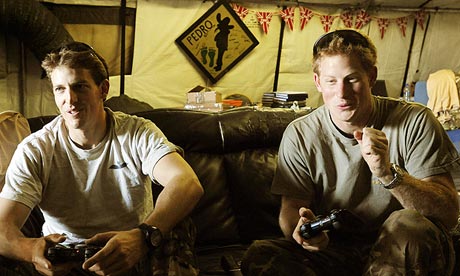
The old class antagonisms have not gone away, but are hidden beneath levels of rank, where each agonises over their worth against others in the price of their house, the size of their vehicle and where, perversely, working longer and longer hours is a sign of winning the game. Work becomes play. Work demands not just one’s mind and body but also one’s soul. You have to be a team player. Your work has to be creative, inventive, playful — ludic, but not ludicrous. Work becomes a gamespace, but no games are freely chosen any more. Not least for children, who if they are to be the winsome offspring of win-all parents, find themselves drafted into endless evening shifts of team sport. The purpose of which is to build character, of course. Which character? The character of the good sport. Character for what? For the workplace, with its team camaraderie and peer enforced discipline. For others, work is still just dull, repetitive work, but the dream is to escape into the commerce of play — to make it into the major leagues, or compete for record deals as a diva or a playa in the rap game. And for still others, there is only the game of survival.

“Either you’re slingin’ crack rock or you got a wicked jump shot." - Biggie
Play becomes everything to which it was once opposed. It is work, it is serious, it is morality, it is necessity.
The old identities fade away. Nobody has the time. The gamer is not interested in playing the citizen. The courtroom is fine as a spectator sport, but being a citizen just involves you in endless attempts to get out of jury duty. Got a problem? Tell it to Judge Judy. The gamer elects to choose sides only for the purpose of the game. This week it might be as the Germans vs. the Americans. Next week it might be as a gangster against the law. If the gamer chooses to be a soldier and play with real weapons, it is as an Army of One, testing and refining personal skill points. The shrill and constant patriotic noise you hear through the speakers masks the slow erosion of any coherent fellow feeling within the remnants of national borders. This gamespace escapes all checkpoints. It is an America without qualities, for everyone and nobody. All that is left of the nation is an everywhere that is nowhere, a utopia of noisy, righteous victories and quiet, sinister failures. Manifest destiny — the right to rule through virtue — gives way to its latent destiny — the virtue of right through rule.
The gamer is not really interested in faith, although a heightened rhetoric of faith may fill the void carved out of the soul by the insinuations of gamespace. The gamer’s God is a game designer. He implants in everything a hidden algorithm. Faith is a matter of the intelligence to intuit the parameters of this geek design and score accordingly. All that is righteous wins; all that wins is righteous. To be a loser or a lamer is the mark of damnation. When you are a gamer, you are left with nothing to believe in but your own God-given abilities. Gamers confront each other in games of skill which reveal who has been chosen by the game as the one who has most fully internalised its algorithm.
Outside each cave is another cave; beyond the game is another game. Each has its particular rules; each has its ranks of high scores. Is that all there is? The gamer who lifts an eye from the target risks a paralysing boredom.
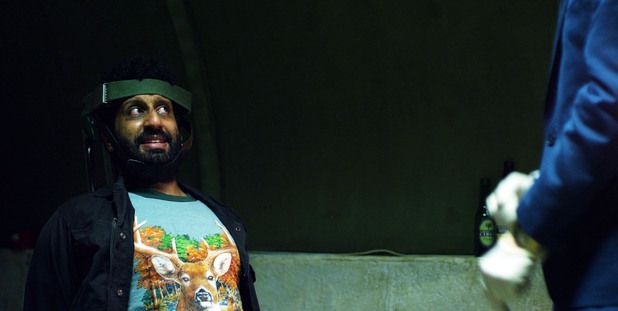
“At the base of contemporary cynicism is the fact that men and women learn by experiencing rules rather than ‘facts’… Learning the rules, however, also means recognising their unfoundedness and conventionality…. We now face several different ‘games’, each devoid of all obviousness and seriousness, only the site of an immediate self-affirmation — an affirmation that is much more brutal and arrogant, much more cynical, the more we employ, with no illusions but with perfect momentary adherence, those very rules whose conventionality and mutability we have perceived." - Paulo Virno
So this is the world as it appears to the gamer: a matrix of endlessly varying games — a gamespace — all reducible to the same principles, all producing the same kind of subject who belongs to this gamespace in the same way — as a gamer to a game. What would it mean to lift one’s eye from the target, to pause on the trigger, to unclench one’s ever-clicking finger? Is it even possible to think outside The Cave™? Perhaps with the triumph of gamespace, what the gamer as theorist needs is to reconstruct the deleted files on those who thought pure play could be a radical option, who opposed gamespace with their revolutionary playdates.

“Subversion… is an all embracing reinsertion of things into play. It is the act whereby play grasps and reunites beings and things hitherto frozen solid in a hierarchy of fragments." - Raoul Vaneigem
Play, yes, but the game — no.
“I have scarcely begun to make you understand that I don’t intend to play the game." - Guy Debord
‘Play’ was once a great slogan of liberation.
“The new beautiful freaks will teach us all how to play again (and they’ll suffer society’s penalty)." - Richard Neville

Play was once the battering ram to break down the Chinese walls of alienated work, of divided labour. Only look at what has become of play. Play is no longer a counter to work. Play becomes work; work becomes play. Play outside of work found itself captured by the rise of the digital game, which responds to the boredom of the player with endless games of repetition, level after level of difference as more of the same. Play no longer functions as a fulcrum for a critical theory. The utopian dream of liberating play from the game, of a pure play beyond the game, merely opened the way for the extension of gamespace into every aspect of everyday life. While the counter-culture wanted worlds of play outside the game; the military entertainment complex countered in turn by expanding the game to the whole world, containing play forever within it.
Perhaps a game like eRepublik could be an allegory for everyday life in gamespace. Work. Train. Fight. Eat. Repeat. But Perhaps a game like this is not just an allegory but also an ‘allegorithm.’ To be a gamer is a slightly different persona to being a reader or a viewer. As the player proceeds through the game, she gradually discovers the rules that operate in the universe constructed by this game. To play the game means to play the code of the game. To win means to know the system. And thus to interpret a game means to interpret its algorithm (to discover its parallel allegorithm). What is distinctive about games is that they produce for the gamer an intuitive relation to the algorithm. The intuitive experience and the organising algorithm together are an allegorithm for a future that in gamespace is forever promised but never comes to pass.
Like the good entertainer, it leaves you demanding more. It does not satisfy. It cannot satisfy. It does not aim to satisfy. It offers only the promise of satisfaction.

An algorithm — for current purposes — is a finite set of instructions for accomplishing some task, which transforms an initial starting condition into a recognisable end condition. In eRep, winning a seat in congress is an algorithm. There is a start condition: you must have a certain number of experience points and a political party. It has end conditions, too. With enough votes the title, points, gold and privileges are won. The gamer selects one sequence after another, and gradually learns what they do — that’s algorithm. The gamer discovers a relationship between appearances and algorithm in the game which is a double of the relation between appearances and a putative algorithm in gamespace — that’s allegorithm. But there is always a gap between the intuitively knowable algorithm of the game and the passing, uneven, unfair semblance of an algorithm in the everyday life of gamespace — this is the form that allegory now takes.
From the point of view of representation, the game is always inadequate to everyday life. But from the point of view of allegorithm, it all seems more the other way around. Everyday life in gamespace seems an imperfect version of the game. The gamespace of everyday life may be more complex and variegated, but it seems much less consistent, coherent and fair. Perhaps this was always the utopian promise of the digital — a real of absolute, impersonal equity and serenity. The game opens a critical gap between what gamespace promises and what it delivers. What is true is not real; what is real is not true. This is what the double movement of allegorithm and allegory have to report. The game is true in that its algorithm is consistent, but this very consistency negates a world that is not.
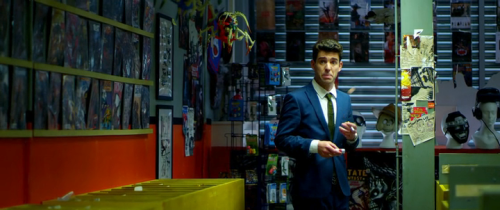
eRepublik is a more perfect copy of gamespace. Here rules are rules and they do not bend. Illusions maintain. This is what makes it so appealing to the gamer. It is serene and dependable.
Except when it isn't. From time to time some unexpected event in the gamespace disrupts the game. Like an earthquake bringing tremors, chaos is reintroduced. For example, a server change may become necessary to maintain the illusionary topology. But this transition isn't smooth. There is the kind of inexplicable economic chaos that we thought only existed in "Real Life", in gamespace. What happened to the sacred algorithm we have come to understand and depend on?

Cracks begin to appear. There is a reversal of perspective and heretics begin to question the game designer God. There exists a certain anarchy and some of us begin to see that the shadows on the cave walls are just shadows and we crave for more. We crave for satisfaction and a fulfilling experience of everyday life and genuine play that draws players out of the bounds of eRep and gamespace, liberates us from the usual rules, turns the world upside down.
"The praxis of play involves the refusal of leaders, of sacrifice, of roles, freedom for everyone to realise himself." - Raoul Vaneigem
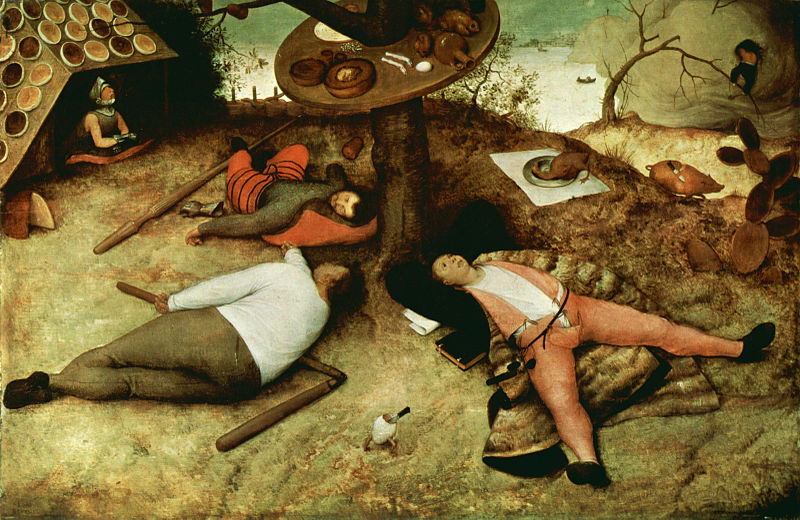
There is a medieval myth of a utopia called the land of Cockayne. It was an idea present in many European cultures of the time. Ireland, England, France, Italy, Spain, Germany, Holland and Sweden all have Cockayne tales, though in Germany it was called Schlaraffenland - the land of milk and honey - in Holland Luilekkerland - lazy lucious land - and in Sweden Lubberland - Lazyland. This was a land where the lazy was king, where nuns were flipped over to show their bottoms, the skies rained cheese and there is no concept of work or sin, and where gluttony is a virtue. Roasted pigs wander about with knives in their backs to make carving easy, where grilled geese fly directly into one's mouth, where cooked fish jump out of the water and land at one's feet. The weather is always mild, the wine flows freely, sex is readily available, and all people enjoy eternal youth.
If we are to have utopias, let them be carnivals. Not just dreams of idealised states of idleness, but explosive playful revolts.
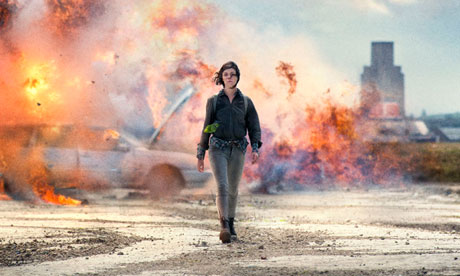


Comments
Where is Jessica Hyde?
Lady , pls back to couisine.
oh boy, i gotta make me some coffee b4 reading this novel hehe
Your comprehensive Liberal Arts education is showing, you are a credit to your race; 'The Human Race'. Perhaps TL - but did read........... pure brilliance!
Thoroughly enjoyed this.
Holographic universe? Best not to ask.
It's easier to detach in remote places. When the power grids finally fail, humanity might recover; though I doubt they will have the skills required to survive.
Miau
summary pls!